Modern Times
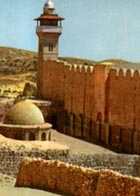 On the Heritage Trail
On the Heritage TrailTuesday, March 2, 2010 | Jewish Ideas Daily » Daily Features
Unlike Ariel Sharon, Prime Minister Benjamin Netanyahu did not have to take a stroll on the Temple Mount to provoke Palestinian Arab leaders into threatening mayhem. Instead, Netanyahu simply announced a comprehensive plan to strengthen Israel's national heritage by rehabilitating and preserving archaeological and historic sites, developing historic trails, and conserving photographs, films, books, and music of archival value. "A people," he declared, "must know its past in order to ensure its future." Unveiled on February 2, the plan was greeted with a yawn by the mainstream Israeli media, mixed with a few deprecating remarks about Jewish chauvinism, and was largely ignored by Palestinians....
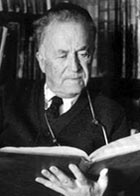 Agnon
AgnonThursday, February 25, 2010 | Jewish Ideas Daily » Daily Features
In 1966 a diminutive man, a large black kippah perched on his head, was awarded the Nobel Prize for literature. His acceptance speech, delivered in the lilting cadences of his native Galicia, brimmed with allusions to holy texts, conjuring up an evanescent aura of piety and sacred longings. Yet underneath that kippah, and vibrating in the spaces between the ancient Hebrew words, was one of the most cunning minds and radical pens in Jewish literary history. Born Shmuel Yosef Czazkes in the town of Buczcacz, S. Y. Agnon, who died 40 years ago today at the age of eighty-one, moved to...
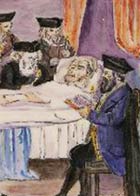 Holy Societies
Holy SocietiesFriday, February 19, 2010 | Jewish Ideas Daily » Daily Features
In the Hebrew calendar, Sunday February 21 is the seventh day of Adar, the date traditionally marking the death of Moses on Mount Nebo, overlooking Canaan, alone with God. The Lord's personal oversight of Moses' interment, in a place "unknown to this day" (Deuteronomy 34:6), inspired the rabbis of the Talmud to praise the act of burying the dead with dignity as an expression of true (because unrecompensed) kindness and indeed of imitatio dei, the injunction to follow God's ways. So it is that the seventh day of Adar is designated by tradition to honor the institution of the Hevra Kadisha, the "holy society"...
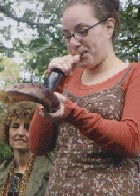 New Communities
New CommunitiesTuesday, February 16, 2010 | Jewish Ideas Daily » Daily Features
Recent years have seen a surge of new Jewish communities: experiments in communal living like Moishe House, urban kibbutzim in Israel's inner cities, back-to-nature programs combining organic farming, kashrut, and "eco-justice," and, perhaps most notably, independent minyanim in the U.S., Israel, and elsewhere. These last—communities focused principally or exclusively on prayer—shun not only the formality and organizational heft of most synagogues but also the labels and authority of denominational Judaism. Some of the most prominent have been created by Orthodox Jews seeking to make room for greater participation by women; others comprise young people experimenting with their own forms of...
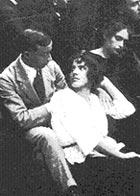 Eastern Europe
Eastern EuropeThe rediscovery—and recovery—of Eastern Europe are central elements in contemporary Jewish culture. Ultra-Orthodoxy tries to maintain versions of Eastern European dress, speech, and mores. The theology of Abraham Joshua Heschel, the melodies of Shlomo Carlebach, the sound of klezmer, the literary productions of authors as disparate as S.Y. Agnon and Jonathan Safran Foer: all in their distinct ways seek to find, in the murdered world of Eastern Europe, a source of living energy for the present. Not all succeed, and only the best display a grasp of the sheer complexity of the civilization they mean to retrieve and/or to reconstruct. In one impressive recent study, large swathes of...
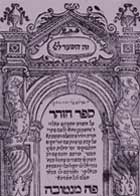 Fakes
FakesThursday, February 11, 2010 | Jewish Ideas Daily » Daily Features
The celebrated French intellectual Bernard-Henri Lévy had some explaining to do this week when it emerged that a philosopher he'd respectfully cited was a figment of somebody else's imagination. Jewish history boasts its own roster of hoaxes and fabrications. Most famously, the Zohar, purportedly the teaching of talmudic mystics, was largely written in the 13th century. Another product of the Middle Ages was a pseudo-talmudic text imposing extraordinary stringencies on menstruating women. In both cases, the authors clearly believed they were enunciating things that the ancients must have themselves believed. The authors of the Golem legend similarly believed that if Rabbi...
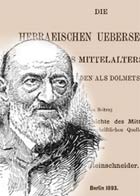 Master of the Book
Master of the BookTuesday, February 9, 2010 | Jewish Ideas Daily » Daily Features
"Of making many books there is no end." In the hands of the master bibliographer Moritz Steinschneider, a phenomenon that induced despair in the author of Ecclesiastes was converted into great science and even greater art. Steinschneider (1816–1907) lived through the 19th century and into the early decades of the 20th. One of the founders of the academic study of Judaism before there were typewriters, let alone departments of Jewish studies, he took upon himself the gargantuan task of cataloguing the vast numbers of Hebrew and Judaic treasures, in print and manuscript, scattered throughout state, municipal, and university libraries of Europe. His output was as staggering as it was painstakingly...
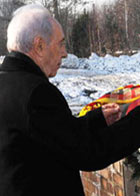 Holocaust Days
Holocaust DaysThursday, January 28, 2010 | Jewish Ideas Daily » Daily Features
Yesterday, Shimon Peres delivered an address, in Hebrew, before the Bundestag as Germany and other nations marked International Holocaust Day, commemorating the date in 1945 when Soviet forces arrived at Auschwitz. Israeli and American Jews conduct their own Holocaust remembrances in the spring, on the anniversary of the Warsaw Ghetto uprising. Ultra-Orthodox Jews, uneasy with the Zionist emphasis on force and resistance, hold their memorials on the tenth of Tevet, one of the traditional fast days for the destruction of the Temple. In short, the Holocaust remains as open to interpretation, reinterpretation—and misunderstanding—as is the hole it blew through all the history...
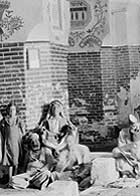 Ezekiel’s Tomb
Ezekiel’s TombTuesday, January 19, 2010 | Jewish Ideas Daily » Daily Features
Twenty-five centuries have passed since exiled Jews first wept for Zion by the waters of Babylon. Today only eight Jews are left in Iraq. Their story is not as well known as that of their European brethren, but in the Babylonian Talmud, for starters, Babylon-Iraq was home to the most influential post-biblical book in Jewish history. That it would become so was due to the Geonim, another extraordinary set of Iraqi rabbis who flourished in early Islamic times and whose most significant figure was Saadya ben Joseph (882/892–942). After the Middle Ages, creativity extended outward as well, with Iraqi Jews founding other...
 It Isn’t Even Past
It Isn’t Even PastThursday, January 7, 2010 | Jewish Ideas Daily » Daily Features
The recent theft and recovery of the sign Arbeit Macht Frei from the gate of Auschwitz, and the emotional responses elicited by the incident, drive home just how deeply embedded the Holocaust and its imagery remain in contemporary consciousness. No doubt, this world-historical event will long continue to occupy a central place in human memory—along with, unfortunately, whatever permutations, distortions, and outright falsifications time will add to those that have already accumulated in the overheated political rhetoric of our own age. That is why, here and now, as we enter perhaps the final decade of the event's living memory, the issue...
Editors' Picks
The Jordanian Option Mudar Zahran, Middle East Quarterly. As they watch the rebellions in Egypt, Libya, and Syria unfold, how much longer will the Palestinians in Jordan stand for their mistreatment at the hands of the Hashemite regime?
Choose Your Poison Philologos, Forward. Why do some say l'chaim when blessing wine: to confirm that the drink hasn't been poisoned, to dispel grim associations, or simply to make sure that all present are ready for the blessing?
Getting Iran Wrong Alan Johnson, Jewish Chronicle. Why have intellectuals from Foucault to Žižek found it so very difficult to see dictatorships for what they are, or to summon up the moral clarity to oppose them?
Israel's Pulp Fiction Evan Lewis, Arizona State University News. Countercultural publishing thrived in Israel's first decades, with Westerns, espionage thrillers, science fiction, and what might be seen as the country's first literary responses to the Holocaust.
After the Fall Amr Bargisi, Samuel Tadros, Tablet. In the eyes of two Egyptian thinkers, the Tahrir revolution was never democratic or liberal—and it was never in the interests of the middle class.
The Riddle of the Mufti Norman Goda, H-Net. Haj Amin al-Husseini threw a long shadow as a precursor to the Arab and Muslim factions whose brand of anti-Semitism borrows much from the Western traditions that they otherwise despise.
The Arab Spring and the Islamic State Ed Husain, New York Times. In the recent uprisings, the burning of American or Israeli flags was not a central display; the protesters focused on internal, national problems. That's how they must continue.
EastEnders Stephen Burstin, Jewish Week. London's East End was once a hub of immigrant Jewish life, with a soup kitchen that served 5,000 meals a day, a Yiddish theater, countless synagogues, Petticoat Lane Market, and . . . Jacob the Ripper?
Open House Yitzhak Benhorin, Ynet. Rahm Emanuel is now mayor of Chicago, Dan Shapiro turned down the position of Middle East desk chief, and Dennis Ross has resigned. Is there anyone left in the White House who understands Israel?
The Mentalist Larry Getlen, New York Post. While Erik Jan Hanussen could hypnotize women into "the throes of orgasm" and use handwriting to discern intimate details of a person's life, his greatest trick was luring the Nazis into a deep, dependent alliance with a Jew.

